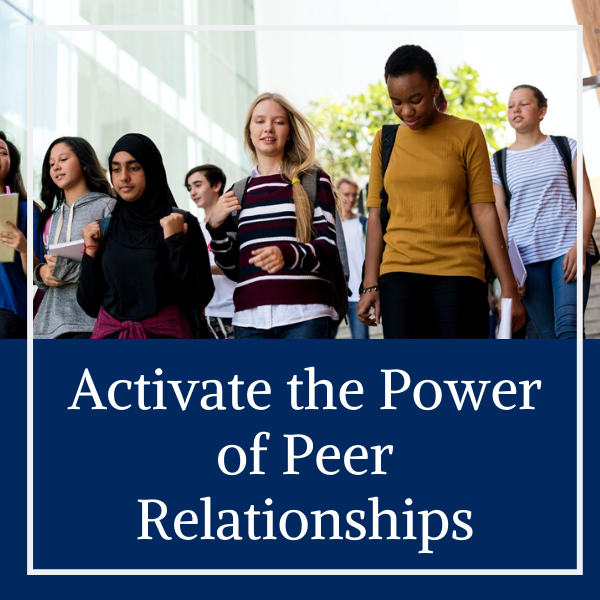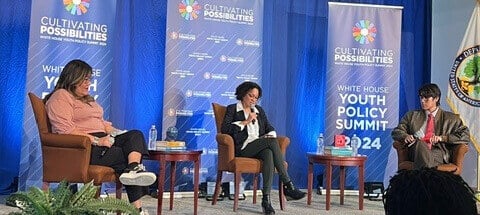Blog
8 Guiding Principles to Activate Developmental Relationships
It’s difficult, if not impossible, to find any positive developmental outcome that isn’t shaped by relationships. Each and every young person needs developmental relationships—the close connections through which young people discover who they are, cultivate abilities to shape their own lives, and learn how to engage with and contribute to the world around them. When developmental relationships increase over time, so do positive youth development outcomes.
Search Institute’s continued research on developmental relationships has provided a deeper understanding of how these relationships are cultivated with, among, and between young people. This insight is drawn from the experiences of youth, expert practitioners, and parents, alongside various research studies, leading to the creation of the Developmental Relationships Framework. Like all frameworks, this is intended to be a map, not the destination. As you embark on your journey, consider these 8 guiding principles to harness the power of developmental relationships:
-
Developmental relationships are multidimensional and dynamic
Developmental relationships go beyond caring. They also involve challenging growth, providing support, sharing power, and expanding possibilities. - Developmental relationships are the roots of success, resilience, and thriving
Developmental relationships offer stability and support as young people navigate their world and find their role within it. When young people experience strong developmental relationships they are less likely to engage in high-risk behaviors, such as substance abuse and violence; and are more likely to report a range of positive outcomes, from academic success to social-emotional competencies and prosocial behavior.

-
Each and every young person should have opportunities to cultivate developmental relationships
We can all agree that young people deserve to be seen, heard, valued, and safe, but the reality is that not all young people feel this way in the spaces and places they spend time. Therefore, we also have to consider who is and who is not experiencing developmental relationships. Each and every young person should have opportunities for and experience developmental relationships, regardless of their personal characteristics or circumstances. -
Developmental relationships are two-way, mutual interactions
Each person in the relationship contributes to and benefits from the relationship. In a supportive and nurturing relationship, both parents and children positively impact each other's lives. Similarly, teachers and youth development workers who cultivate meaningful connections with their students and program participants gain insights and are shaped by these young individuals, often in significant ways, while also having a potentially transformative effect on the students. -
Create an environment that supports relationships with each and every young person
The multidimensional nature of human development requires us to acknowledge and affirm the uniqueness of every young person while also identifying the barriers and systemic disparities faced by youth, especially those from groups who have been underserved or marginalized. An equity-centered approach to developmental relationships not only acknowledges the barriers experienced by youth and families that have been pushed to the margins, but also works to provide the opportunities and resources needed for them to thrive. -
Emphases among the five elements may vary at different points in a young person’s development and circumstances
Developmental relationships are receptive to the needs of young people at various stages of their lives. They present differently based on individuals' backgrounds, identities, strengths, needs, and circumstances. During periods of high stress, young people might require adults and peers to focus on expressing care and providing support. At other times, the focus might shift towards challenging growth or expanding opportunities. Developmental relationships are responsive to young people and what they need at specific times in their lives. -
Healthy environments are vital for relationships to flourish
Just as plants and their roots flourish in healthy ecosystems, relationships (the roots of development) are most likely to be healthy and strong when they are in environments that provide the nourishment they need. The relational culture of an organization plays an essential role in ensuring that all young people, regardless of background or circumstances, have the nurturing, support, and guidance they need to learn, grow, and thrive. Cultivating a relationship-rich environment in an organization requires an intentional focus as well as support systems and structures aligned with this goal. -
Developmental relationships matter across the contexts of young people’s lives
Each and every young person benefits from experiencing developmental relationships across the places they spend time. They do best when they have a network of developmental relationships that is present in and connects across the many different parts of their lives, including teachers, family members, practitioners, mentors, and others. These important relationships open doors to new opportunities, create a sense of belonging, offer advice, and provide other forms of emotional and tangible support.
Strong developmental relationships are essential to youth thriving. By creating a supportive network that includes parents, peers, educators, program staff, coaches, and mentors we can ensure that youth have access to the opportunities and resources they need to thrive.





